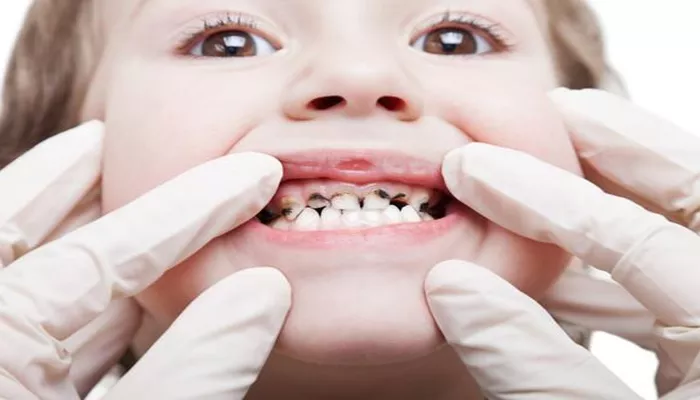Cavities, commonly known as dental caries or tooth decay, are structural defects in teeth caused by the action of acids produced by bacteria on food debris, especially sugars and starches, that remain on the teeth. These acids dissolve the minerals in tooth enamel, leading to the formation of holes or cavities. Understanding whether cavities can “fall down” involves exploring the nature of tooth decay, its progression, and the potential consequences if left untreated.
Understanding Cavities
What Are Cavities?
Cavities are essentially holes in the teeth that form due to the loss of tooth structure. This process begins when plaque, a sticky film of bacteria, food debris, and saliva, accumulates on the teeth. The bacteria in plaque feed on sugars and starches from food and produce acids as a byproduct. Over time, these acids can erode the enamel, the hardest substance in the human body, leading to the formation of tiny holes or pits.
Progression of Cavities
The progression of a cavity can be divided into several stages:
Initial Enamel Decay: This stage is often reversible with proper dental hygiene and fluoride treatments. Fluoride can help remineralize the enamel, reversing early decay.
Dentin Involvement: If the decay progresses beyond the enamel and reaches the dentin, the tooth becomes more sensitive to temperature changes and pressure. Dentin is softer than enamel and decays more rapidly.
Pulp Exposure: If the decay reaches the pulp, the soft tissue inside the tooth that contains nerves and blood vessels, it can cause severe pain and infection. At this stage, root canal treatment or tooth extraction may be necessary.
Advanced Decay and Tooth Loss: If left untreated, the decay can continue to spread, eventually leading to the complete destruction of the tooth structure and its loss.
Can Cavities “Fall Down”?
The term “fall down” in the context of cavities is somewhat misleading. Cavities do not physically detach from the tooth and fall off like a loose tooth. Instead, they represent areas of tooth structure that have been eroded by acid and are now missing.
Consequences of Untreated Cavities
While cavities do not “fall down” in the literal sense, they can lead to several serious consequences if left untreated:
Pain and Discomfort: As the decay progresses, it can reach the pulp, causing severe pain and discomfort. This pain can be spontaneous, triggered by temperature changes, or caused by pressure on the tooth.
Infection and Abscess: If the decay reaches the pulp, it can lead to infection. An abscess, a collection of pus, may form at the root of the tooth. This can cause swelling, fever, and other systemic symptoms.
Tooth Loss: Advanced decay can lead to the complete destruction of the tooth structure, resulting in tooth loss. Tooth loss can affect chewing, speech, and overall oral health.
Spread of Infection: If left untreated, an infection in the tooth can spread to surrounding tissues, including the jawbone and sinuses. In severe cases, it can even spread to other parts of the body, causing life-threatening complications.
Treatment Options for Cavities
The treatment of cavities depends on the severity of the decay and the location of the tooth. Common treatment options include:
Fillings: For small to moderate-sized cavities, a dentist may use a filling material to restore the tooth structure. Fillings can be made of various materials, including amalgam (a mixture of metals), composite resin (a tooth-colored plastic), or porcelain.
Crowns: For larger cavities or teeth that have been weakened by decay, a crown may be necessary. A crown is a custom-made cap that fits over the tooth and restores its shape, size, and function.
Root Canal Treatment: If the decay has reached the pulp, root canal treatment may be required. This involves removing the infected pulp, cleaning and shaping the canal, and filling it with a special material. A crown is usually placed over the tooth to protect it.
Extraction: In some cases, especially if the tooth is severely damaged or infected, extraction may be the best option. Extraction involves removing the tooth from its socket in the jawbone.
Prevention of Cavities
The best way to avoid the consequences of untreated cavities is to prevent them from occurring in the first place. Here are some effective prevention strategies:
Good Dental Hygiene: Brush your teeth at least twice a day with fluoride toothpaste, and floss daily to remove plaque and food debris from between the teeth.
Regular Dental Check-ups: Visit your dentist regularly for professional cleanings and check-ups. Early detection and treatment of cavities can prevent them from progressing to more serious stages.
Healthy Diet: Limit sugary and starchy foods, which can feed the bacteria in plaque and produce acids. Choose a balanced diet that includes plenty of fruits, vegetables, and whole grains.
Fluoride Supplements: If you live in an area with low water fluoridation, consider taking fluoride supplements to help strengthen your tooth enamel.
Sealants: Dental sealants are thin, plastic coatings that are painted onto the chewing surfaces of teeth, especially molars, to prevent decay. They can be particularly effective in children and adolescents.
Conclusion
In summary, cavities do not physically “fall down” from the teeth. Instead, they represent areas of tooth structure that have been eroded by acid and are now missing. While cavities themselves do not detach and fall off, they can lead to serious consequences if left untreated, including pain, infection, tooth loss, and even life-threatening complications. The best way to avoid these consequences is to prevent cavities from occurring in the first place through good dental hygiene, regular check-ups, a healthy diet, fluoride supplements, and dental sealants. If you do develop a cavity, early detection and treatment can prevent it from progressing to more serious stages and help you maintain a healthy, beautiful smile.
Related topics:

